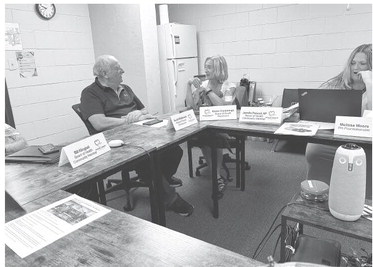Programs exist to help prevent, address homelessness among veterans
According to the National Coalition for Homeless Veterans, while veterans make up about 7% of the general population, they account for nearly 13% of the homeless adult populations.
The U.S. Department of Housing and Urban Development estimates that 40,056 veterans are homeless on any given night. While discussions of homeless populations can conjure images of tent cities or people sleeping on steam grates in urban centers, the reality is that homelessness and housing insecurity look different in rural areas. The veterans who are “staying with a friend” in a rural area or otherwise do not have a permanent address are homeless.
In addition to private organizations that focus on getting homeless individuals into permanent housing, there are programs designed specifically to meet the unique needs of veterans.
The Taylor County Veterans Service office is a starting point to assist veterans facing homelessness or housing insecurity to tap into resources available through the HUD-VASH program. The U.S. Department of Housing and Urban Development-VA Supportive Housing (HUDVASH) Program is a collaborative program between HUD and VA that combines HUD housing vouchers with VA supportive services to help Veterans who are homeless and their families find and maintian permanent housing.
Through public housing authorities, HUD provides rental assistance vouchers for privately owned housing to Veterans who are eligible for VA health care services and are experiencing homelessness.
VA case managers may connect these veterans with support services, such as health care, mental health treatment and substance use counseling to help them in their recovery process and with their ability to maintain housing in the community.
Congress has appropriated additional funding for new HUD-VASH vouchers every year since 2008.
Each year, HUD and VA have collaboratively awarded HUD-VASH vouchers based on current geographic need and public housing agency (PHA) performance. Since 2017, the allocation process for awarding HUD-VASH vouchers has changed to allow PHAs to self-identify their interest in the program. HUD publishes an annual HUDVASH Registration of Interest Notice containing detailed instructions that PHAs must follow if they are interested in receiving a portion of the available HUD-VASH vouchers. PHAs must have the support of a partnering VA facility and meet any utilization threshold requirements to be eligible for an award. After the registration period has closed, HUD and VA use a formula to determine relative need, and ultimately invite eligible PHAs to apply for a specific number of HUD-VASH vouchers. The associated funding awarded for HUD-VASH vouchers is determined by the actual average per unit cost (PUC) at each PHA.
There is at least one PHA currently administering HUD-VASH in each of the 50 states, Having adequate housing is often just one need for veteran facing housing insecurity. According to the National Coalition for Homeless Veterans, in addition to the complex set of factors influencing all homelessness – extreme shortage of affordable housing, livable income and access to health care – a large number of displaced and at-risk veterans live with lingering effects of posttraumatic stress disorder (PTSD) and substance abuse, which are compounded by a lack of family and social support networks. Additionally, military occupations and training are not always transferable to the civilian workforce, placing some veterans at a disadvantage when competing for employment.
A top priority for homeless veterans is secure, safe, clean housing that offers a supportive environment free of drugs and alcohol.
For very low-income Veterans, Supportive Services for Veteran Families (SSVF) provides case management and supportive services to prevent the imminent loss of a Veteran’s home or identify a new, more suitable housing situation for the individual and his or her family; or to rapidly re-house Veterans and their families who are homeless and might remain homeless without this assistance.
How It Works Through referrals and direct outreach, nonprofit agencies and community cooperatives use SSVF funding to quickly house Veterans and their families who are homeless and keep others from slipping into homelessness by providing time-limited supportive services that promote housing stability. Case management includes help securing VA and other benefits such as educational aid and financial planning.
The Taylor County Veterans Service Office, and veterans service offices throughout the state, are available as starting points for veterans to get assistance to help address service-related medical needs and benefits. Through veterans service offices the veterans can also access information about programs such as HUD-VASH that can help provide housing security.



